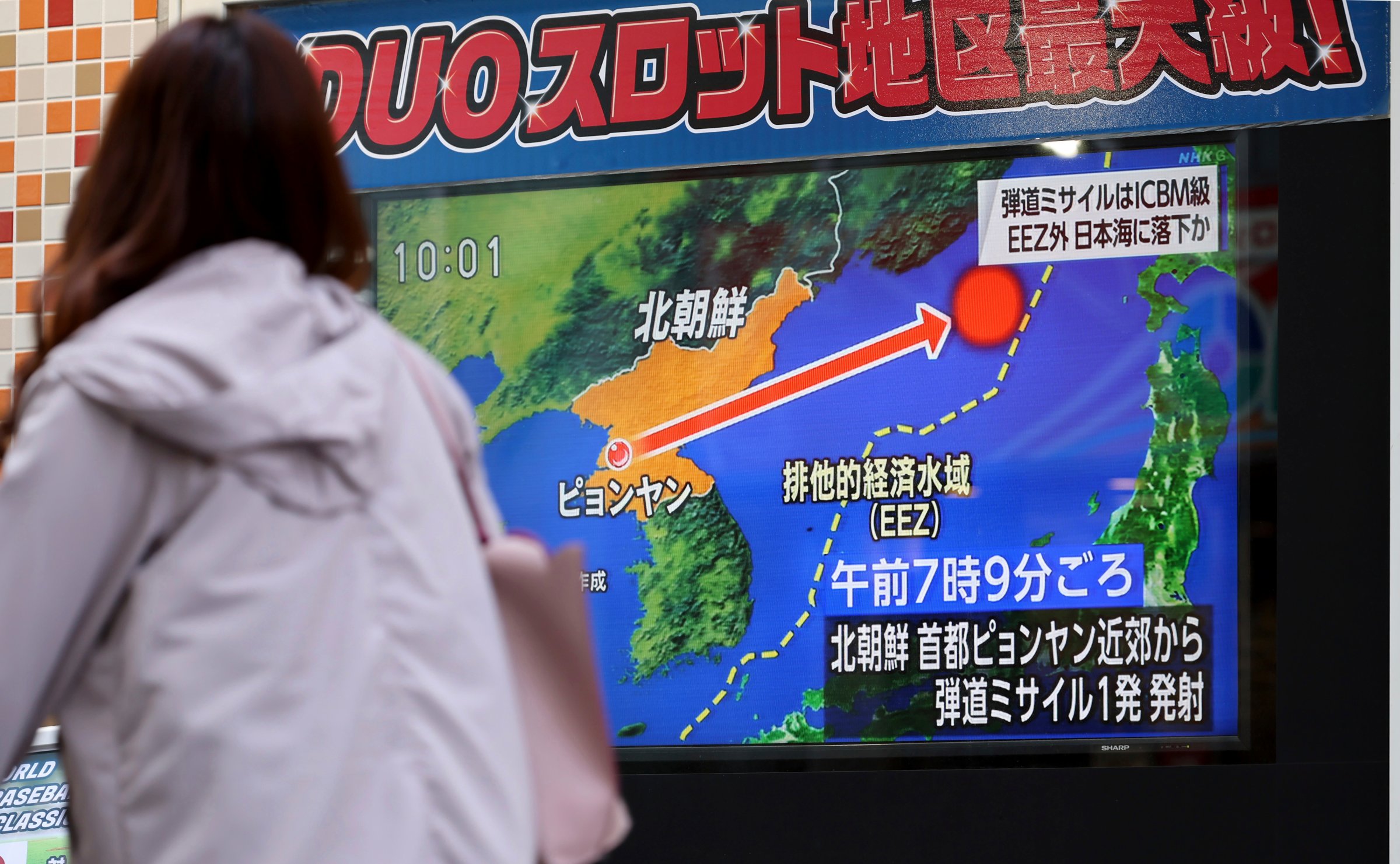
North Korea test-fired a suspected intercontinental ballistic missile, hours before a planned summit between South Korean and Japanese leaders in Tokyo aimed at mending ties and bolstering security cooperation with their US ally.
Japan determined the missile launched by North Korea on Thursday was likely an ICBM, national public broadcaster NHK reported in a one-line dispatch. South Korea’s Joint Chiefs of Staff said the launch of a long-range ballistic missile took place at around at 7:10 a.m. from an area near Pyongyang’s main international airport, where North Korea has a facility to launch ICBMs designed to carry a warhead to the US.
The missile appeared to be launched in a lofted trajectory and traveled a distance of about 1,000 kilometers, the JCS said, while Kyodo News said it fell in waters outside of Japan’s exclusive economic zone. North Korea last test-fired an ICBM about a month ago. That missile flew for about 66 minutes and reached an altitude of about 5,700 kms (3,540 miles) and a distance of about 900 kms.
The ICBM on Thursday caps a busy few weeks for North Korea, which had shot off 11 ballistic missiles since Feb. 18 that included the other ICBM and what appeared to be a new close-range ballistic missile designed to hit US bases in South Korea. It also fired two cruise missiles from a submarine, which appeared to be another first.
This was the third ICBM North Korea has fired since November, when Kim brought his preteen daughter to the launch where she made her debut in state media. Her appearance signaled there is another generation waiting in the family dynasty forged in the Cold War and it will depend on nuclear weapons for its survival.
South Korean President Yoon Suk Yeol departed South Korea on Thursday for Tokyo, as he tries to end several years of feuding over compensation for Japan’s use of Korean forced labor during its 1910-45 occupation of the peninsula. It’s the first visit by a South Korean leader since 2019, and will include a meeting with Prime Minister Fumio Kishida, the first such summit on Japanese soil in more than a decade.
Before Yoon left for Japan, South Korea convened a meeting of its National Security Council to discuss the launch.
Yoon and Kishida will talk over a proposal in which certain South Korean firms would pay into a fund offering compensation for Koreans conscripted to work at Japanese mines and factories during the colonial period.
Under Yoon’s plan for the colonial-era workers, South Korean companies, rather than Japanese ones, would finance a foundation to pay Koreans conscripted into labor. Japan has indicated it could roll back export controls that came into effect a few years ago as the feud flared, which could help secure supplies of crucial materials for South Korea’s chipmakers.
President Joe Biden’s administration welcomed the move, calling it a “groundbreaking” deal. Yoon said it was in the interests of both countries to “end the vicious cycle of mutual hostility and work together.”
The forced-labor deal could open new areas of cooperation among the three sides, beyond mending an intelligence-sharing pact that nearly unraveled at the height of the recent feuding. While Yoon had stepped up security cooperation with Washington and Tokyo, including three-way drills in international waters off the Korean Peninsula, deeper ties were difficult as long as South Korea was expecting Japanese companies to pay victims.
North Korea regards Japan, South Korea and the US as its mortal enemies, and Kim Jong Un been bolstering his state’s ability to deliver a nuclear strike that could hit the neighbors and deliver a warhead to the American mainland.
Yoon said in a joint interview with international media ahead of the trip the current North Korean nuclear situation is different from the past, and threatens peace and security on the Korean Peninsula and beyond. He said cooperation among his country, Japan and the US was more important than ever, and Seoul will continue to press Kim to abandon his atomic ambitions. Yoon also said the US was not a part of the deal to remedy the forced labor issue.
“Since the complete denuclearization of North Korea is the clear and unchanging goal of the international community, the Republic of Korea will never acknowledge North Korea as a nuclear state under any circumstances,” Yoon said, referring to his country by its formal name.
The latest launch also coincided with joint US-South Korean military drills starting this week that have been denounced by Pyongyang.
On Monday, the US and South Korea commenced 11 days of Freedom Shield military exercises, which are among the most significant drills between the two allies in years. The exercises are aimed at strengthening their defense capabilities against North Korea’s nuclear and missile threats.
North Korea has condemned such drills, considering them as a prelude to a potential invasion and nuclear war.
—With assistance from Ryotaro Nakamaru.
More Must-Reads From TIME
- The 100 Most Influential People of 2024
- Coco Gauff Is Playing for Herself Now
- Scenes From Pro-Palestinian Encampments Across U.S. Universities
- 6 Compliments That Land Every Time
- If You're Dating Right Now , You're Brave: Column
- The AI That Could Heal a Divided Internet
- Fallout Is a Brilliant Model for the Future of Video Game Adaptations
- Want Weekly Recs on What to Watch, Read, and More? Sign Up for Worth Your Time
Contact us at letters@time.com